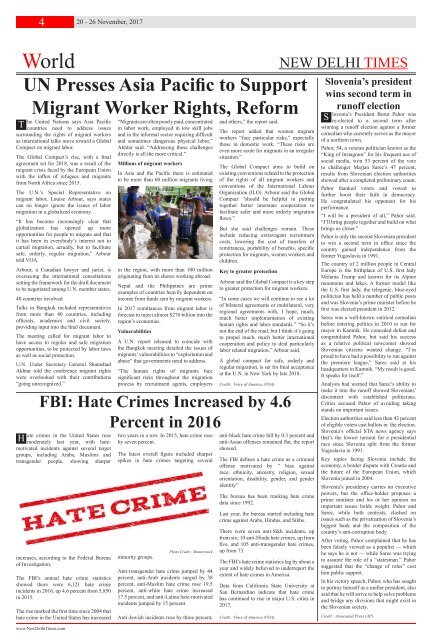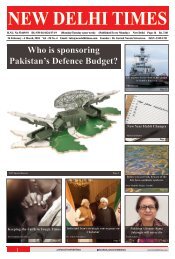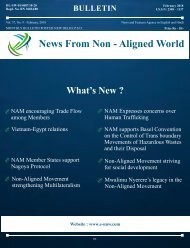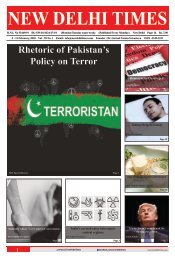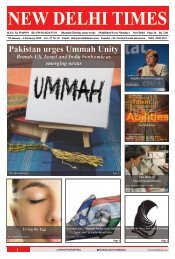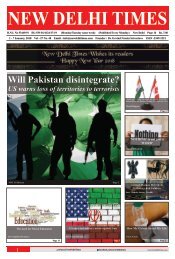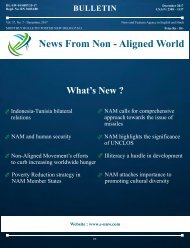20 - 26 November 2017 - 16-min
Create successful ePaper yourself
Turn your PDF publications into a flip-book with our unique Google optimized e-Paper software.
4<br />
<strong>20</strong> - <strong>26</strong> <strong>November</strong>, <strong>20</strong>17<br />
T<br />
H<br />
World<br />
UN Presses Asia Pacific to Support<br />
Migrant Worker Rights, Reform<br />
he United Nations says Asia Pacific<br />
countries need to address issues<br />
surrounding the rights of migrant workers<br />
as international talks move toward a Global<br />
Compact on migrant labor.<br />
The Global Compact’s rise, with a final<br />
agreement set for <strong>20</strong>18, was a result of the<br />
migrant crisis faced by the European Union<br />
with the influx of refugees and migrants<br />
from North Africa since <strong>20</strong>15.<br />
The U.N.’s Special Representative on<br />
migrant labor, Louise Arbour, says states<br />
can no longer ignore the issues of labor<br />
migration in a globalized economy.<br />
“It has become increasingly clear that<br />
globalization has opened up more<br />
opportunities for people to migrate and that<br />
it has been in everybody’s interest not to<br />
curtail migration, actually, but to facilitate<br />
safe, orderly, regular migration,” Arbour<br />
told VOA.<br />
Arbour, a Canadian lawyer and jurist, is<br />
overseeing the international consultations<br />
setting the framework for the draft document<br />
to be negotiated among U.N. member states.<br />
40 countries involved<br />
Talks in Bangkok included representatives<br />
from more than 40 countries, including<br />
officials, academics and civil society,<br />
providing input into the final document.<br />
The meeting called for migrant labor to<br />
have access to regular and safe migration<br />
opportunities, to be protected by labor laws<br />
as well as social protection.<br />
U.N. Under Secretary General Shamshad<br />
Akhtar told the conference migrant rights<br />
were overlooked with their contributions<br />
“going unrecognized.”<br />
www.NewDelhiTimes.com<br />
“Migrants are often poorly paid, concentrated<br />
in labor work, employed in low skill jobs<br />
and in the informal sector requiring difficult<br />
and sometimes dangerous physical labor,”<br />
Akhtar said. “Addressing these challenges<br />
directly is all the more critical.”<br />
Millions of migrant workers<br />
In Asia and the Pacific there is estimated<br />
to be more than 60 million migrants living<br />
in the region, with more than 100 million<br />
originating from its shores working abroad.<br />
Nepal and the Philippines are prime<br />
examples of countries heavily dependent on<br />
income from funds sent by migrant workers.<br />
In <strong>20</strong>17 remittances from migrant labor is<br />
forecast to inject almost $276 billion into the<br />
region’s economies.<br />
Vulnerabilities<br />
A U.N. report released to coincide with<br />
the Bangkok meeting detailed the issues of<br />
migrants’ vulnerabilities to “exploitation and<br />
abuse” that governments need to address.<br />
“The human rights of migrants face<br />
significant risks throughout the migration<br />
process by recruitment agents, employers<br />
and others,” the report said.<br />
The report added that women migrant<br />
workers “face particular risks,” especially<br />
those in domestic work. “These risks are<br />
even more acute for migrants in an irregular<br />
situation.”<br />
The Global Compact aims to build on<br />
existing conventions related to the protection<br />
of the rights of all migrant workers and<br />
conventions of the International Labour<br />
Organization (ILO). Arbour said the Global<br />
Compact “should be helpful in putting<br />
together better interstate cooperation to<br />
facilitate safer and more orderly migration<br />
flows.”<br />
But she said challenges remain. These<br />
include reducing extravagant recruitment<br />
costs, lowering the cost of transfers of<br />
remittances, portability of benefits, specific<br />
protection for migrants, women workers and<br />
children.<br />
Key to greater protection<br />
Arbour said the Global Compact is a key step<br />
to greater protection for migrant workers.<br />
“In some cases we will continue to see a lot<br />
of bilateral agreements or multilateral, very<br />
regional agreements with, I hope, much,<br />
much better implementation of existing<br />
human rights and labor standards.” “So it’s<br />
not the end of the road, but I think it’s going<br />
to propel much, much better international<br />
cooperation and policy to deal particularly<br />
labor related migration,” Arbour said.<br />
A global compact for safe, orderly and<br />
regular migration, is set for final acceptance<br />
at the U.N. in New York by late <strong>20</strong>18.<br />
Credit : Voice of America (VOA)<br />
FBI: Hate Crimes Increased by 4.6<br />
Percent in <strong>20</strong><strong>16</strong><br />
ate crimes in the United States rose<br />
moderately last year, with hatemotivated<br />
incidents against several target<br />
groups, including Arabs, Muslims and<br />
transgender people, showing sharper<br />
increases, according to the Federal Bureau<br />
of Investigation.<br />
The FBI’s annual hate crime statistics<br />
showed there were 6,121 hate crime<br />
incidents in <strong>20</strong><strong>16</strong>, up 4.6 percent from 5,850<br />
in <strong>20</strong>15.<br />
The rise marked the first time since <strong>20</strong>04 that<br />
hate crime in the United States has increased<br />
two years in a row. In <strong>20</strong>15, hate crime rose<br />
by seven percent.<br />
The latest overall figure included sharper<br />
spikes in hate crimes targeting several<br />
<strong>min</strong>ority groups.<br />
Photo Credit : Shutterstock<br />
Anti-transgender hate crime jumped by 44<br />
percent, anti-Arab incidents surged by 38<br />
percent, anti-Muslim hate crime rose 19.5<br />
percent, anti-white hate crime increased<br />
17.5 percent, and anti-Latino hate-motivated<br />
incidents jumped by 15 percent.<br />
Anti-Jewish incidents rose by three percent,<br />
anti-black hate crime fell by 0.3 percent and<br />
anti-Asian offenses remained flat, the report<br />
showed.<br />
The FBI defines a hate crime as a cri<strong>min</strong>al<br />
offense motivated by “ bias against<br />
race, ethnicity, ancestry, religion, sexual<br />
orientation, disability, gender, and gender<br />
identity”<br />
The bureau has been tracking hate crime<br />
data since 1992.<br />
Last year, the bureau started including hate<br />
crime against Arabs, Hindus, and Sikhs.<br />
There were seven anti-Sikh incidents, up<br />
from six; 10 anti-Hindu hate crimes, up from<br />
five, and 105 anti-transgender hate crimes,<br />
up from 73.<br />
The FBI’s hate crime statistics lag by about a<br />
year and widely believed to underreport the<br />
extent of hate crimes in America.<br />
Data from California State University at<br />
San Bernardino indicate that hate crime<br />
has continued to rise in major U.S. cities in<br />
<strong>20</strong>17.<br />
Credit : Voice of America (VOA)<br />
NEW DELHI TIMES<br />
Slovenia’s president<br />
wins second term in<br />
S<br />
runoff election<br />
lovenia’s President Borut Pahor was<br />
re-elected to a second term after<br />
winning a runoff election against a former<br />
comedian who currently serves as the mayor<br />
of a northern town.<br />
Pahor, 54, a veteran politician known as the<br />
“King of Instagram” for his frequent use of<br />
social media, won 53 percent of the vote<br />
to challenger Marjan Sarec’s 47 percent,<br />
results from Slovenian election authorities<br />
showed after a completed preli<strong>min</strong>ary count.<br />
Pahor thanked voters and vowed to<br />
further boost their faith in democracy.<br />
He congratulated his opponent for his<br />
performance.<br />
“I will be a president of all,” Pahor said.<br />
“I’ll bring people together and build on what<br />
brings us closer.”<br />
Pahor is only the second Slovenian president<br />
to win a second term in office since the<br />
country gained independence from the<br />
former Yugoslavia in 1991.<br />
The country of 2 million people in Central<br />
Europe is the birthplace of U.S. first lady<br />
Melania Trump and known for its Alpine<br />
mountains and lakes. A former model like<br />
the U.S. first lady, the telegenic, blue-eyed<br />
politician has held a number of public posts<br />
and was Slovenia’s prime <strong>min</strong>ister before he<br />
first was elected president in <strong>20</strong>12.<br />
Sarec was a well-known satirical comedian<br />
before entering politics in <strong>20</strong>10 to run for<br />
mayor in Kamnik. He conceded defeat and<br />
congratulated Pahor, but said his success<br />
as a relative political newcomer showed<br />
Slovenian citizens wanted change. “I’m<br />
proud to have had a possibility to run against<br />
the premiere league,” Sarec said at his<br />
headquarters in Kamnik. “My result is good.<br />
It speaks for itself.”<br />
Analysts had warned that Sarec’s ability to<br />
make it into the runoff showed Slovenians’<br />
discontent with established politicians.<br />
Critics accused Pahor of avoiding taking<br />
stands on important issues.<br />
Election authorities said less than 42 percent<br />
of eligible voters cast ballots in the election.<br />
Slovenia’s official STA news agency says<br />
that’s the lowest turnout for a presidential<br />
race since Slovenia split from the former<br />
Yugoslavia in 1991.<br />
Key topics facing Slovenia include the<br />
economy, a border dispute with Croatia and<br />
the future of the European Union, which<br />
Slovenia joined in <strong>20</strong>04.<br />
Slovenia’s presidency carries no executive<br />
powers, but the office-holder proposes a<br />
prime <strong>min</strong>ister and his or her opinion on<br />
important issues holds weight. Pahor and<br />
Sarec, while both centrists, clashed on<br />
issues such as the privatization of Slovenia’s<br />
biggest bank and the composition of the<br />
country’s anti-corruption body.<br />
After voting, Pahor complained that he has<br />
been falsely viewed as a populist — which<br />
he says he is not — while Sarec was trying<br />
to assume the role of a “statesman.” Pahor<br />
suggested that the “change of roles” cost<br />
him public support.<br />
In his victory speech, Pahor, who has sought<br />
to portray himself as a unifier president, also<br />
said that he will strive to help solve problems<br />
and bridge any divisions that might exist in<br />
the Slovenian society.<br />
Credit : Associated Press (AP)


